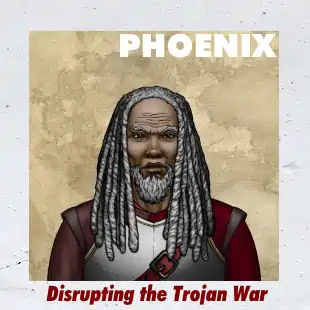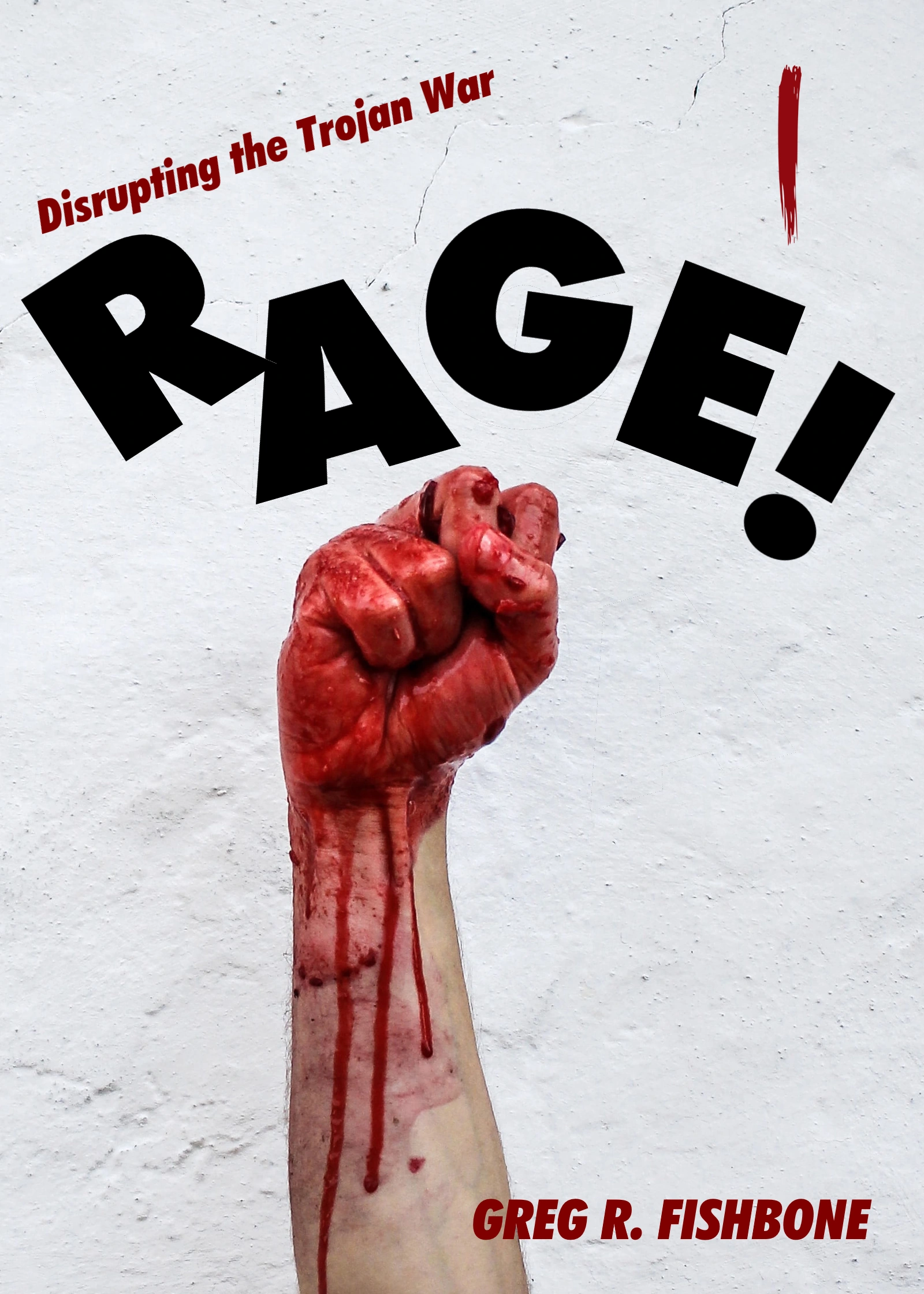Rage! (Iliad I)
Remove these ads. Join the Worldbuilders Guild
Table of Contents
Recap and Status 1. "Epic Hotness Countdown" 2. "To the Victor Go the Spoils" 3. "The Concubine and the Prince" 4. "Don't Smite the Messenger" 5. "Patron of the Mice" 6. "In the Beard of Agamemnon" 7. "The Routine" 8. "Men Are Such Fools" 9. "Achaeans, Assemble!" 10. "Agamemnon Himself" 11. "Something Happened" 12. "Alternate Plans" 13. "Errand-Girl" 14. "Speaking with Authority" 15. "That Time I Spoke and Everyone Ignored Me" 16. "To Olympus by Chariot" 17. "Nostos" 18. "The View from a Distance" 19. "The Water Bearers" 20. “Here Today, Here Tomorrow” 21. ”Strategic Thinking” 22. "Embers of the Mind" 23. “How the Evergreen Lost Its Leaves” 24. “Tears of Strength and Resilience” 25. “The Strong Man and the King” 26. “The Aether Speaks” 27. “Something Holy and Immortal” Weekly Chapters Every Sunday25. “The Strong Man and the King”

Centering Phoenix,
Lieutenant to Achilles:
I find Achilles in his hut.
The woman pours us wine.
She's not the woman sought by Agamemnon,
but the other,
the one Achilles gifted to Patroclus,
the one whose name I can never remember
though I like her well enough.
She pours a well-flavored cup of wine.
"My boy,
my boy,
my boy,
what have you done now?"
I ask.
He sits cross-legged across the legless table from me.
"I did the right thing, Uncle.
I did the brave thing.
I did the thing no one else would do.
I saved the men from destruction.
And what is my reward?
Nothing.
Less than Nothing.
The man who caused our curse
and cursed our cause
takes my reward for himself,
while I wallow in dishonor and ruin.
Such a man doesn't deserve to rule over me, Uncle.
My service to him is complete.
If Agamemnon wants to break Ilion's walls,
he can crack his rock-solid head against them!"
It would seem then,
that the rumors rang true.
The Myrmidons are bound for home.
But Achilles seems troubled by unfinished business.
I recognize that look he gets,
wistful yet determined,
distant yet present,
conflicted,
much like any child, I suppose.
"Do you have a story for me, Uncle?"
he asks.
I nod
and take a sip of fortifying wine.
"A king once sent his best man on a mission.
'Slay the invulnerable lion,'
the king ordered.
'A difficult task,'
the strong man considered.
'but I can do it.'
'Then bring its magic-soaked hide back to me,'
the king added.
'Its protection shall be my prize.'
The strong man did as he was bid,
and slayed the Nemean lion,
and returned with the magic-soaked hide,
but the saber-toothed cat,
even in death,
turned the king pale with terror,
and so the king ordered the strong man to take the hide away.
The strong man did as he was bid,
and wore the invulnerable hide as a spear-deflecting mantle.
'Slay the many-headed serpent,'
the king ordered next.
'A difficult task,'
the strong man considered.
'but I can do it.'
'Then bring its poisonous blood back to me,'
the king added.
'Its death-dealing power shall be my prize.'
The strong man did as he was bid,
and slayed the many-headed Hydra,
and returned to the king
with a cauldron
of noxious,
toxic,
bubbling blood
that sickened the king with its fumes,
and so the king ordered the strong man to take the blood away.
The strong man did as he was bid,
and used the deathly poison to coat his arrow points.
The king ordered more tasks,
but each time,
the honor and glory slipped through his royal fingers
and accrued only to the strong man.
The strong man became a legend.
The king became an exemplar of ridicule.
Finally, the king's last order:
'Travel to the Realm of Hades and back!'
'A difficult task,'
the strong man considered,
'but I can do it.'
'Bring the three-headed guard dog back to me,'
the king added,
'Immortality shall be my prize.'
The strong man did as he was bid,
and returned with monstrous Cerberus,
terrifying to behold,
which made the king weep and tremble,
and to soil himself,
they say.
The king urged the strong man to bring the monster back
to grateful Hades,
who remembered the favor,
and allowed the strong man to bypass his realm,
upon his death,
and to join the gods in the Olympian court
where he still resides today."
Achilles frowns.
"The story of the king and the strong man,
of Eurystheus and Heracles,
is an interesting choice, Uncle.
But while Agamemnon holds the staff
of his infamous kinsman,
I am no son of Zeus."
"And yet,
like Heracles in the mountains of Atlas,
you have shouldered someone else's burden.
I commend your compassion,
my boy,
but you are no Overlord of Hellas,
and never shall be.
That is the moral of my tale."
Through the doorflap
enters Patroclus,
the second son I never had.
I rise to greet his warm embrace.
Behind him, a woman bites her lip.
That woman.
Yes, that woman.
The one sought by Agamemnon.
The one who spices her wine with too much bitter.
I hope our Overlord likes it that way.
Patroclus shifts from one foot to the other.
"Heralds have come."
"And you herald the heralds?"
Achilles teases.
"The heralds fear to enter your presence,"
says the woman,
says that woman,
with a pitiable glimmer of hope in her voice.
"They fear you will resist their charge."
Achilles widens his eyes.
"Messengers of Agamemnon fear that I would harm them?
Do they think I'd ever harm an ally?
Have they so little regard for who I am?"
"You are the man who drew a sword on their master,"
Patroclus reminds him.
"After he dishonored me,
and worse,
after he endangered every life in this camp,
fighting men and heralds alike!
By the will of Athena I spared the tyrant's life,
and even this mercy is turned against me."
"So what further allegiance do you owe him?"
Patroclus asks.
"If he can't have you in his battle formation,
why should he have your woman in his bed?"
Wistful yet determined,
distant yet present,
conflicted,
Achilles looks to me.
"My boy,
my boy,
my boy.
The strong man does as he is bid.
Delay your homeward journey.
Return to the war.
Leaving your resistant path may be a labor,
but you can do it.
Submit to Agamemnon,
and your glory will accrue as the gods will it."
"I fear,
Uncle,
that I am not the strong man you believe.
I am already committed to resistance.
I have already quit this war.
What matter is an additional disobedience?
Tell the men to ready the ships.
We leave for home
and we'll be taking Briseis with us."
Patroclus rejoices,
but the woman bites her lip.
"You won't," says the woman.
Briseis.
Briseis is her name.
"Agamemnon will view such an act
as an abduction,
as an insult,
as a threat to his authority.
He will throw his army against your home,
the lovely Phthia you speak of in your sleep.
I will not be a cause of war
as Helen caused this war
by vacillating between Paris and Menelaus.
Take your honor,
intact,
from this rocky shore.
Accept your fate
and leave me to mine."
Achilles nods.
Despite the continued protests of Patroclus,
Achilles nods his head.
Without the benefit of a story,
Achilles nods his head and sighs,
and I wonder
at the power this woman has
over my boy,
my boy,
my poor lost boy.
EPIC CYCLE ROADMAP:
* The Kypria* The Iliad
* The Posthomerica
* Tales of Nostos
* The Odyssey
* The Telegony
* The Aeneid
Rage is the first book of the Iliad. Amazons is the first book of the Posthomerica.







